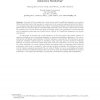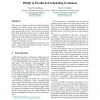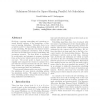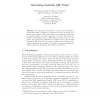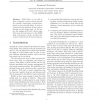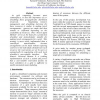JSSPP
2005
Springer
13 years 10 months ago
2005
Springer
The recent success of Internet-based computing projects, coupled with rapid developments in peer-to-peer systems, has stimulated interest in the notion of harvesting idle cycles u...
JSSPP
2005
Springer
13 years 10 months ago
2005
Springer
Recently HP Labs engaged in a joint project with DreamWorks Animation to develop a Utility Rendering Service that was used to render part of the computer-animated feature film Shr...
JSSPP
2005
Springer
13 years 10 months ago
2005
Springer
User estimates of job runtimes have emerged as an important component of the workload on parallel machines, and can have a significant impact on how a scheduler treats different ...
JSSPP
2005
Springer
13 years 10 months ago
2005
Springer
Irregular and iterative I/O-intensive jobs need a different approach from parallel job schedulers. The focus in this case is not only the processing requirements anymore: memory, ...
JSSPP
2005
Springer
13 years 10 months ago
2005
Springer
Using historical information to predict future runs of parallel jobs has shown to be valuable in job scheduling. Trends toward more flexible jobscheduling techniques such as adapt...
JSSPP
2005
Springer
13 years 10 months ago
2005
Springer
There are many choices to make when evaluating the performance of a complex system. In the context of parallel job scheduling, one must decide what workload to use and what measur...
JSSPP
2005
Springer
13 years 10 months ago
2005
Springer
Sociology, computer networking and operations research provide evidence of the importance of fairness in queuing disciplines. Currently, there is no accepted model for characteriz...
JSSPP
2005
Springer
13 years 10 months ago
2005
Springer
Our main goal in this paper is to study the scheduling of parallel BSP tasks on clusters of computers. We focus our attention on special characteristics of BSP tasks, which can use...
JSSPP
2005
Springer
13 years 10 months ago
2005
Springer
With Grids, we are able to share computing resources and to provide for scientific communities a global transparent access to local facilities. In such an environment the problems...
JSSPP
2005
Springer
13 years 10 months ago
2005
Springer
As grid computing becomes more commonplace, so does the importance of coscheduling these geographically distributed resourcest. Negotiating resource management and scheduling deci...

